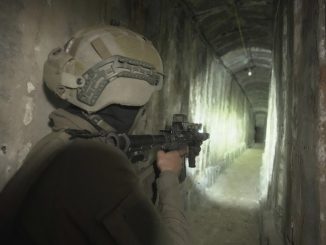
Lebanese Prime Minister Nawaf Salam (right) meets with US envoy Thomas Barrack (centre) in Beirut on Monday [Ibrahim Amro/AFP]
| Published July 11, 2025
🇺🇸 U.S. Envoy Thomas Barrack Applauds Lebanon’s Response on Hezbollah Disarmament 🌍
On July 7, 2025, Thomas Barrack—America’s Ambassador to Turkey and Special Envoy for Syria—returned to Beirut following his June 19 proposal to disarm Hezbollah within four months. He met President Joseph Aoun and described Lebanon’s seven-page response as “spectacular” and “something we got back in a very short period of time.” He was “unbelievably satisfied” with the level of engagement Al
🚥 The Proposal at a Glance
Barrack’s roadmap, presented in Beirut, includes:
-
Full disarmament of Hezbollah within 4 months.
-
Withdrawal of Israeli forces from several southern posts.
-
Cessation of Israeli airstrikes on Lebanese territory.
-
Support for Lebanese economic reforms in parallel
🏛️ Lebanese Reaction
Although Hezbollah itself has not formally accepted, Lebanon’s government drafted a detailed seven-page counter-proposal. President Aoun announced an uptick in Lebanese Army deployment—around 10,000 troops—and pledged that only army units and UN peacekeepers would carry arms along the border
🔥 The Regional Context
-
This diplomatic effort comes amid Israeli airstrikes targeting Hezbollah infrastructure—even after the November 2024 ceasefire—resulting in civilian casualties and destabilizing ongoing talks
-
Lebanon is deftly balancing its alliances, aiming to meet U.S. demands while addressing Hezbollah’s insistence that disarmament must be reciprocal—meaning Israel’s withdrawal must advance first
⚖️ Diplomatic Significance
Barrack’s strong words—calling the response “spectacular”—reflect U.S. determination to anchor Hezbollah’s demilitarization within a broader international framework tied to economic aid and stability in Lebanon. His use of comparisons to evolving dialogues involving Syria and Israel indicates Washington’s zeroing-in on coordinated regional pressure .
 Resulting Effects
Resulting Effects
1. Strengthened U.S.-Lebanon Diplomatic Ties
Thomas Barrack’s praise for Lebanon’s response significantly boosts U.S.-Lebanon relations. The open and prompt engagement suggests renewed diplomatic trust and potential U.S. backing in Lebanon’s political and economic reforms.
2. Heightened Pressure on Hezbollah
While Hezbollah has not officially accepted the proposal, the Lebanese government’s response signals a willingness to challenge Hezbollah’s unchecked military presence—potentially isolating the group politically if it refuses to engage. The U.S. plan increases pressure without direct confrontation.
3. Israeli Military Posture Under Scrutiny
The plan’s call for Israeli troop withdrawals and cessation of airstrikes could refocus international attention on Israel’s military actions in southern Lebanon. If Israel continues airstrikes during diplomatic negotiations, it could face criticism or stall the process.
4. Regional Domino Effect
Barrack’s role ties Hezbollah disarmament to broader U.S. strategy in Syria and Israel. Progress in Lebanon could create momentum for similar initiatives in Syria or other Iranian-influenced territories. Conversely, failure may embolden militant factions elsewhere.
5. Potential Stabilization of Southern Lebanon
If implemented, the plan could finally shift control of the southern border fully to the Lebanese Army and UN peacekeepers—removing the threat of a dual-power structure with Hezbollah and lowering the risk of escalation with Israel.
6. Internal Political Shifts in Lebanon
Lebanon’s assertive response—crafted by its government without Hezbollah’s leadership—suggests a potential recalibration of power. Speaker Nabih Berri’s expected role in future mediation may reveal internal tensions between state institutions and Hezbollah’s parallel influence.
7. Economic Aid as Leverage
The U.S. has hinted at economic support tied to progress on this roadmap. Lebanon, grappling with one of the worst financial crises in its history, may view disarmament as a trade-off for potential aid, further incentivizing reform.
 Bottom Line:
Bottom Line:
The U.S.-led roadmap to disarm Hezbollah, backed by Special Envoy Thomas Barrack, represents one of the most assertive diplomatic pushes in years to stabilize Lebanon and reshape regional power dynamics. Lebanon’s swift and detailed response—hailed as “spectacular”—signals a serious commitment from Beirut’s leadership to reassert state control and pursue peace, even if Hezbollah’s full cooperation remains uncertain.
Still, this effort stands at a fragile crossroads: its success hinges on reciprocal Israeli actions, Hezbollah’s willingness to compromise, and continued U.S. engagement. If momentum holds, this could mark the beginning of Lebanon reclaiming sovereignty over its southern border and reducing the threat of war. If not, it risks exposing fractures within Lebanon and reigniting conflict.
In short, the coming weeks will reveal whether diplomacy can succeed where years of conflict and deadlock have failed.





Be the first to comment